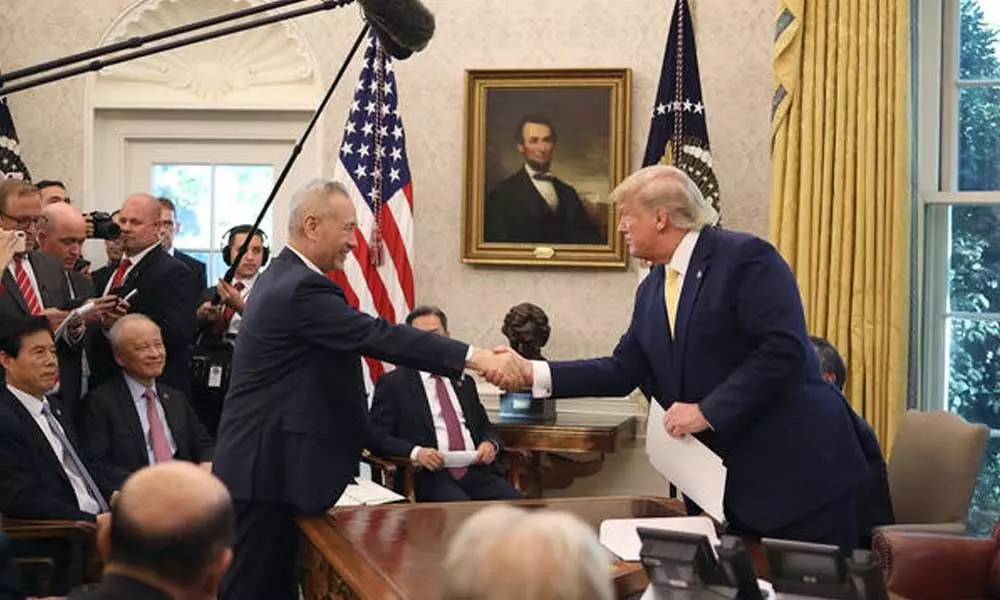Trade truce between China and USA welcomed by companies, economists exercise caution
Share :

Companies have welcomed a US-Chinese trade truce as a possible step toward breaking a deadlock in a 15-month-old tariff war, while economists caution there was little progress toward settling core disputes including technology that threaten global growth.
Beijing: Companies have welcomed a US-Chinese trade truce as a possible step toward breaking a deadlock in a 15-month-old tariff war, while economists caution there was little progress toward settling core disputes including technology that threaten global growth.
President Donald Trump said Washington will suspend a tariff hike planned for Tuesday on USD 250 billion of Chinese goods. In exchange, Trump said China agreed to buy as much as USD 50 billion of American farm goods. Details of other possible agreements weren't immediately released. The bruising battle over China's trade surplus and technology ambitions has disrupted global trade. Economists warn a final settlement might take years to negotiate. Despite that, financial markets rise ahead of each round of talks and fall back when no progress is reported. Companies acknowledged Friday's agreement was a modest step and appealed to both governments to step up efforts to end the fight that is battering manufacturers and farmers.
Washington still is planning a December 15 tariff hike on USD 160 billion of smartphones and other imports. Before then, Trump and Chinese President Xi Jinping are due to attend an economic conference in Chile in mid-November. That is raising hopes a face-to-face meeting might produce progress. "Taking tariffs out of the equation for at last the next two months will give space for substantive negotiations," said Jake Parker, senior vice president of the US-China Business Council, an industry group. Trump said Friday's deal has yet to be put down on paper but said, "We should be able to get that done over the next four weeks." China's government welcomed "substantial progress" but gave no details of possible agreements.
"I don't think it's a victory, but it eases the situation," said economist Yu Chunhai at Renmin University in Beijing. He said both sides want to restore business and consumer confidence. There was no word of agreements on the core issues that sparked the dispute. Those include US pressure on Beijing to roll back plans for government-led creation of global competitors in robotics, electric cars and other technologies. "There remains significant work ahead to address many of the most important US trade and investment priorities," Myron Brilliant, executive vice president of the US Chamber of Commerce, said in a statement. Still, he called Friday's announcement a "ray of hope." Washington, Europe, Japan and other trading partners say China's plans violate its market-opening obligations and are based on stealing or pressuring companies to hand over technology.
Chinese leaders see those tactics as the surest path to prosperity and global influence. "With the key structural issues no closer to being resolved, we suspect that a mini deal would, at best, simply delay a breakdown in the negotiations," said Julian Evans-Pritchard and Martin Lynge Rasmussen of Capital Economics. Friday's announcement also made no mention of commitments by Beijing in sensitive areas including subsidies to industry and cyber security, or the status of telecom equipment giant Huawei, which faces damaging US sanctions.
Trump imposed curbs in May on sales of American components and technology to Huawei Technologies Ltd., China's first global tech brand. Trump has said he is willing to use Huawei, one of the biggest global makers of smartphones and network switching gear, as a bargaining chip in the trade talks. "The two sides will now return to a 'muddle through' strategy that avoids further tariff escalation but may not substantially reduce tensions," Michael Hirson and Kelsey Broderick of Eurasia Group wrote in a report.
"Both the US and China are likely to continue targeting each other through non-tariff measures, such as investment restrictions and regulatory barriers, which will be highly disruptive." Tit-for-tat tariff hikes by both sides have raised costs for producers and consumers. Some companies are shifting production and supply lines out of China to avoid the US tariffs, suggesting they expect the sanctions to stay in place for an extended period. China's exports to the United States, its biggest foreign market, have plunged, adding to pressure on Xi's government to shore up cooling economic growth and avoid politically dangerous job losses.
The looming December 15 tariff hike leaves a "black cloud" over Apple Inc. and other tech companies with factories or customers in China, said Dan Ives of Wedbush Securities in a report. He said it would be a "gut punch" if it goes ahead. US complaints about Chinese technology policies, cyber spying and protection of patents and other intellectual property "will be the focus of tech investors," said Ives. Another potential stumbling block is how to enforce any agreement. Talks broke down in May over Beijing's insistence that Trump's punitive tariffs had to be lifted once a deal took effect. Washington says some must remain in place to ensure Chinese compliance.
Trump and Xi agreed in June to resume negotiations but there have been no breakthroughs. Despite that, Beijing has gone ahead with other industry-opening initiatives aimed at making China's economy more competitive and productive. None, however, addresses Trump's complaints and business groups say they have had little impact on foreign companies.



